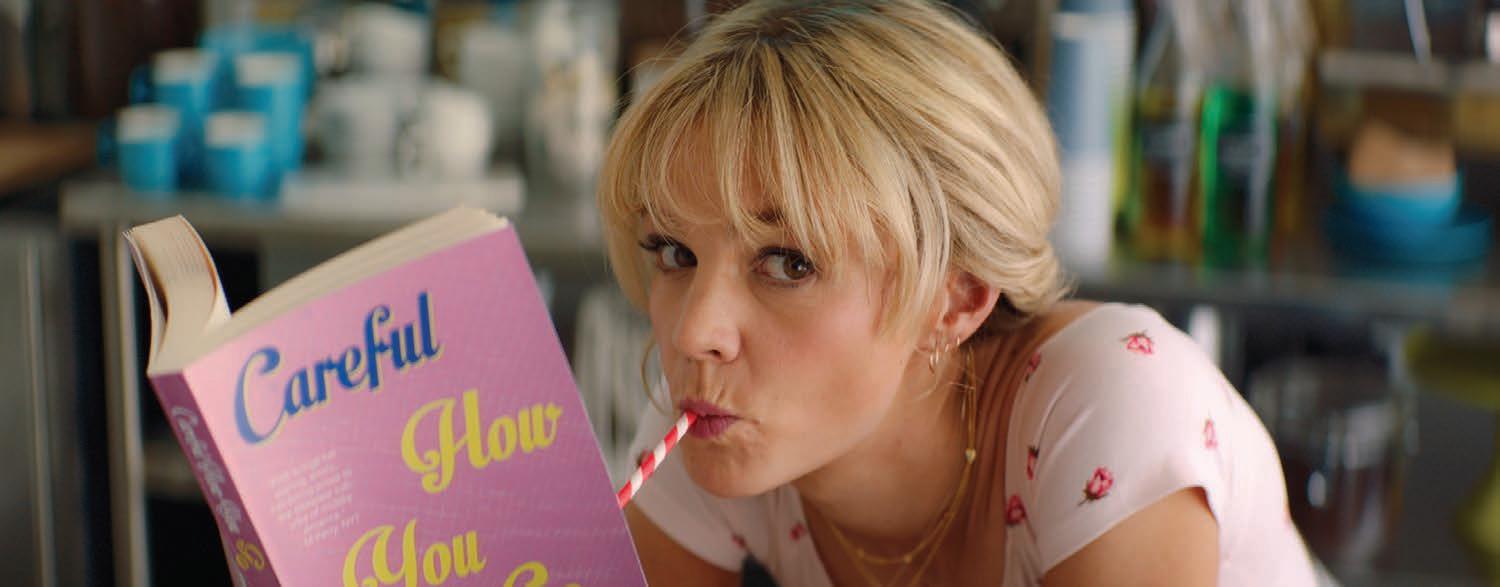
4 minute read
Screens
Uneasy Marks
Promising Young Woman and In & of Itself
Advertisement
Drinking men’s tears with a paper straw to save the planet.
Promising Young Woman
By John J. Bennett
screens@northcoastjournal.com PROMISING YOUNG WOMAN. To call men pigs or dogs more often than not does disservice to pigs and dogs, noble contributors both, though not without their faults. More apt to group them/us with ducks, whose inveterate gang rape I have observed and remain traumatized by, or a particularly nasty virus. Such comparisons are closer to the portrait of the male of the species painted by Emerald Fennell’s feature debut, wherein they are held to the most basic standards — be not monsters — and consistently found criminally wanting. Their indictment is presented in a candied palette with Paris Hilton party music on the soundtrack, so it is perhaps not as dour an experience as it might seem.
Cassandra (Carey Mulligan), who might be or once have been the titular young woman, earnestly, ironically or both, has made a dramatic early-life career change. Once an enthusiastic, talented student enrolled in medical school with an even more precocious best friend, she has since dropped out, gotten a no-stakes job at a bakery/co ee shop, procured a closet full of splashy stilettos and club-girl clothes and remade herself as a sort of reality-check vigilante. Based on a vaguely referenced trauma (which becomes tragically clear in the movie’s second act), Cassandra has taken it upon herself to become an agent of sexual justice, which, in her interpretation, means pretending to be debilitatingly drunk in bars until some ersatz (male) good Samaritan gallantly volunteers to escort her home, his rapacious urges only barely, temporarily concealed.
Noble as her mission might be, it su ers from a degree of displacement; there is a more significant target still at large. And as Cassandra’s relationship with the ostensibly well-intentioned Ryan (Bo Burnham) moves beyond trepidation and obfuscation into genuine a ection, she is drawn back into the outer orbit of her quarry.
Whether to call Promising Young Woman a tragedy, a comedy or a drama with touches of both, is perhaps the most challenging, even jarring aspect of the movie’s treatment of its subject. A revenge tale to be sure, it manages a mostly-delicate tonal balance, creating a heightened reality with its highlighter-array color palette and synth-pop. At bottom, though, this is a story about devastating drama gone unnoticed, of victim-blaming and the normalization of toxic masculinity. In it there are no Good Guys, save maybe Cassandra’s dad, played by the always great Clancy Brown, but one has to wonder if, given more screen-time, even he would prove to be a villain. And therein, despite its many charms, its fine performances and firmly established visual style, lies the challenge in embracing Promising Young Woman unreservedly. Because the movie takes a complex, nuanced aesthetic approach to a story, the themes of which Fennell would appear to view in very simple terms. The result is at once jokey and deadly serious, deceptively light while depicting truly terrible things. And although it is an accomplished, complete work, I cannot help but wonder if that dichotomy will a ect its resonance and longevity, even in a cultural climate where it could not feel more topical and thematically appropriate; that remains to be seen. For the moment, we have a thoroughly watchable and entertaining, if occasionally tonally confusing, debut from a writer/director with a singular voice and perspective, who will hopefully have the opportunity to continue sharing them. R. 113M. AMAZON PRIME.
DEREK DELGAUDIO’S IN & OF ITSELF.
Magic’s broader, diaphanous meaning, now co-opted by neo-hippiedom and a million Pinterest boards, a slightly silly, well-meaning notion of blessedness or pleasant surprise, has little to do with the practice of illusionists, cardsharps, hustlers and confidence tricksters. They are technicians who devote uncountable hours to the refinement of their craft, the goal of which is ultimately to pull one over on someone else and make a profit. It can be seen as the most venal, primal type of show-craft — grift turned entertainment. But then maybe all entertainment is founded on lies and magicians are simply being honest about their dishonesty.
I’ve shared in the childlike appreciation of close-up magic and larger-scale tricks, but as I’ve aged I’ve come to harbor some passing resentment for the cultish protection magicians a ord each other. They form a cabal of deception protecting the tawdry secrets and mechanisms that bind them together and separate them from their audience, their marks. Cynical, yes, but I would argue not without justification. Magic is rarely deployed in service of the elevation of the spirit. More often it’s a ruse to lower the audience’s guard and lift their wallets.
Derek DelGaudio, who might not even call himself a magician, may or may not be part of that mafia. In what he insists is a truth-telling performed in a theater more than 500 times and now recorded for the ages, he admits he was once a cheat, a predatory card mechanic. In this show, though, DelGaudio’s tradecraft is merely a storytelling device for a story meant to illuminate the idea of self as both truth and construct, to recognize and celebrate our common thread of humanity. This sounds, admittedly, both grandiose and silly. But his earnestness, while likely genuine but certainly a part of his show, cuts through the simpler aspects of the artifice, making the project seem genuine and, in spite of myself, somehow important. It represents an uplifting corruption of the lie at the very heart of magic and, while it may be partially built on prevarication itself, it strives to get at some notion of truth and kindness. 90M. HULU.
l
John J. Bennett (he/him) is a movie nerd who loves a good car chase.








